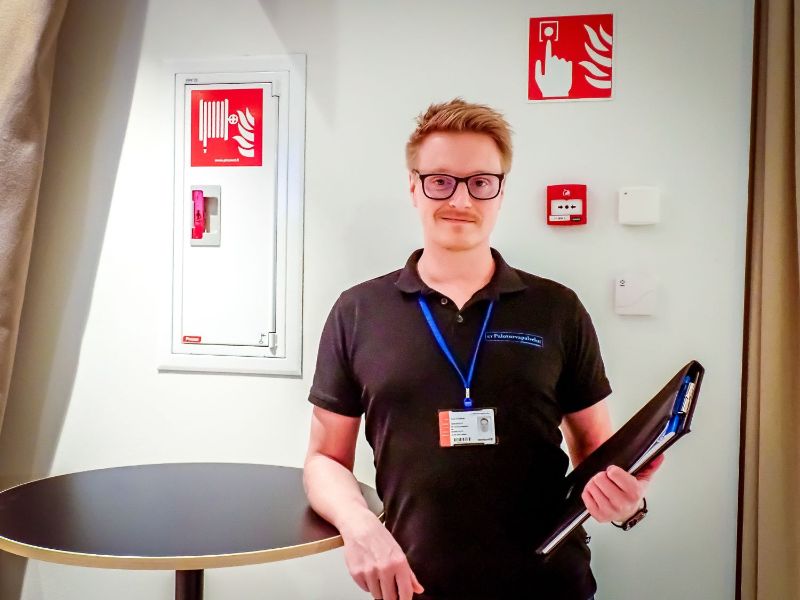Safety expert
"A safety expert needs good organisational skills, as you often have to perform several tasks simultaneously. You also have to have a good knowledge of fire safety legislation. Competence in electrical engineering is a significant benefit as it speeds up locating faults. Having fire brigade experience is also an advantage."

- Tero Väisänen
- Safety expert at KT Paloturvapalvelut Oy.
- Has completed a vocational qualification in electrical engineering at Vantaan ammatti- ja taideteollisuusoppilaitos (now Vantaa Vocational College Varia).
- 15 years of work experience in the field.
Briefly explain what you do for a living.
I work as an expert in a company that provides installation, maintenance and expert services related to fire and property safety. Our clients include housing companies, businesses and public administration. I have several different responsibilities. I’m the foreman and provide electricity-related technical support to fire safety installers. I’m also responsible for managing larger projects, such as the installation of smoke exhaust systems in housing companies. In addition to these tasks, I carry out expert tasks related to fire safety. I prepare emergency and self-monitoring plans and carry out surveys related to fire safety needs.
How have you ended up in the profession of your choice?
I’ve been a member of a voluntary fire brigade all my life. As a result of my hobby, I initially ended up working for another fire safety company where my tasks were related to smoke ventilation. Later, I changed careers and set up an advertising agency. Then the COVID-19 pandemic arrived, and work dwindled. I called my previous manager, under whom I had worked in smoke ventilation projects. He had recently established KT Paloturvapalvelut Oy, and I got a job as an installer. Over time, my responsibilities increased and I started working as a foreman and a safety expert.
Describe your typical working day or week.
Describe your typical working day or week. My day includes a lot of email exchange with customers and various stakeholders, such as fire authorities. Installers call me when they need technical support. If something cannot be solved on the phone, I sometimes meet the installer on site.
In addition to keeping in contact with employees and stakeholders, I take care of supervision tasks, such as finding someone to replace an installer who has fallen ill. Often, my day also includes written tasks, such as preparing an emergency plan for a site that I have previously surveyed.
What kind of work environment or working hours do you have?
I spend most of the day at the office, but I also make short site visits. I usually work from 8 a.m. to 4 p.m., but flexitime means that I can make adjustments to my schedule as needed.
What kind of competence or qualities are required in the profession?
A safety expert needs good organisational skills, as you often have to perform several tasks simultaneously. You also have to have a good knowledge of fire safety legislation. Competence in electrical engineering is a significant benefit as it speeds up locating faults. Having fire brigade experience is also an advantage.
What is the best thing about your profession?
The best part of this job is having the opportunity to take preventive measures to improve fire safety. In my previous fire brigade work, I often had to encounter situations where the accident had already happened.
What are the downsides of the profession or what seems challenging?
I can’t think of very many downsides related to my work. You do have to complete tasks within established deadlines, so the pressure related to timetables sometimes makes you feel that you’re in a hurry.
What would you tell a person considering the profession of a safety expert?
Having experience in electrical engineering is useful, but it’s not a requirement. What counts is the drive to learn new things and grow into more demanding tasks. It’s very likely that you will need to work as an installer for several years before making it to an expert position. A bachelor's degree in Safety, Security and Risk Management may also lead to an expert position in the field, but even then you will need to actively improve your technical knowledge.
How do you see the future of your profession?
Fluctuations in the construction sector affect the work situation. When times are tight, clients only carry out the compulsory fire safety measures. However, statutory fire safety requirements also bring stability and permanence to the sector.
